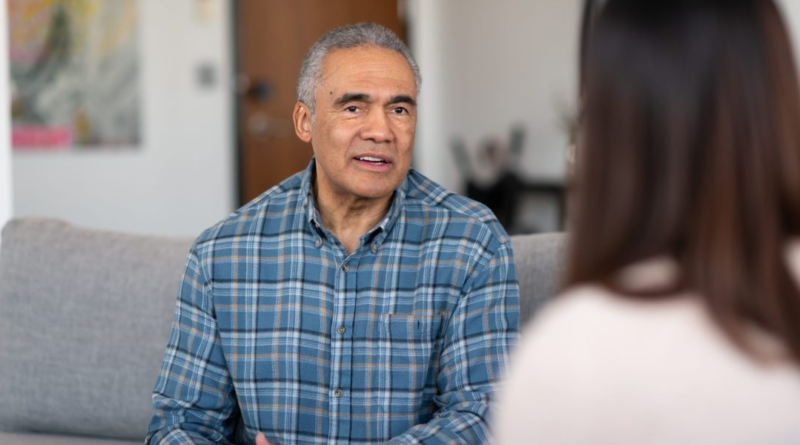Does Medicare pay for mental health care? Here's what services are covered
Many older adults are undiagnosed or untreated for mental health conditions because symptoms like depression or anxiety are often mistaken for normal aging. Yet, mental health issues in those 65 and older are real, and care is vital at this stage of life. Events like the death of a loved one, or concerns about loss of independence, deteriorating health, alcohol or drug dependence, social isolation, and loneliness are real psychological challenges for thousands of older people.
About one in four people on Medicare have a mental health condition, yet only 40% to 50% receive treatment, according to a new report by The Commonwealth Fund. Since the start of the pandemic, anxiety and depression have more than doubled among older people an analysis by KFF (formerly the Kaiser Family Foundation) found. Medicare will pay for many mental health services, but the challenge for countless beneficiaries has been been finding a mental health professional willing and able to accept new patients. Some do not accept assignment, and those who do have months-long waiting lists, thanks to a shortage of providers.
New Medicare payment rules which went into effect at the start of the year should help alleviate some of the provider shortage. Marriage and family therapists, and licensed mental health counselors are now eligible for reimbursement, which could potentially add about 400,000 more mental health professionals to the mix. That’s especially important for people living in rural areas, where workforce shortages are more significant, according to Kathleen Cameron, senior director of the center for healthy aging at the National Council on Aging.
The new reimbursement guidelines mean more older adults can get the help they need, says Cameron. Primary providers may not understand the nuances of diagnosing or treating the unique characteristics of mental health conditions in older adults.
“Sometimes it’s difficult to tease out what’s happening with a person when they present with different symptoms that could be related to depression, other chronic conditions, the use of substances, or to early dementia. Knowing how to ask the right questions and use the right diagnostic tools is really, critical, she says. Additionally, many older people have other chronic illnesses, and medication side effects for those conditions could mimic or exacerbate mental health issues. Or, medications for conditions like bipolar disorder or depression could worsen diseases like diabetes or heart problems.
Getting help for mental health to more older adults
Those on Medicare—both older adults and people with certain disabilities—face many of the same mental health challenges as other special populations, says Beverly Smith, CEO and executive director of the American Mental Health Counselors Association. “Some may not seek treatment out of fear and maybe due to a lack of understanding that having a mental health issue is not a weakness. Overall, our culture has stigmatized mental healthcare and we have stigmatized aging to all be associated with less than, not a good as, damaged, lessen ability to contribute, and incapable.“
Older adults also face some unique challenges, says Roger Smith (no relation) chief advocacy officer of the American Association for Marriage and Family Therapy. In addition to challenges like declining physical health, there may be family challenges, such as increased reliance on an adult child or caregiver, or even grandparents becoming caregivers for grandchildren. “All of these create many mental health challenges and the need for therapy, and we’ve found that over time that Medicare has not been able to provide the kind of coverage needed.”
Some 40% of mental health providers—marriage and family therapists and mental health counselors—all of whom are all at least Master’s level trained and licensed, were excluded from Medicare coverage until now, he adds. “It’s like driving a car with only two and a half wheels.”
Mental health services covered by traditional Medicare
Traditional Medicare pays for both inpatient (Part A, hospital coverage) and outpatient (Part B, medical coverage) mental health treatment from psychiatrists, psychologists, clinical social workers, nurse-practitioners/nurse specialists, and physician assistants, in addition to the newly-approved family therapists and mental health counselors.
Outpatient coverage includes
- an annual depression screening by a primary care provider
- individual and group psychotherapy
- testing and evaluation
- medication management
- diagnostic tests
- some prescription drugs that a provider must administer
- opioid use disorder treatment, including drug counseling, medication, therapy and periodic assessments
- an annual alcohol misuse screening which may include four brief face-to-face counseling sessions each year
Coverage of more intensive outpatient psychiatric treatment went into effect on January 1, 2024.
Beneficiaries are responsible for 20% copayment after meeting their Part B deductible. A supplemental, or Medigap plan, will pick up that cost difference. Additionally, there’s no cost-sharing for opioid use disorder treatment from a Medicare provider. Most antidepressants and antipsychotics are covered under the Part D drug plan, but not all drugs are included, so make sure you know what your plan covers before enrolling in a Part D plan.
Adding additional therapists into the coverage pool will alleviate some of the backlog, says AMHCA’s Beverly Smith. but it will take time before everyone becomes Medicare certified. Medicare reimbursement “increases access to care and treatment for the elderly. Our older adults have the right to select their provider and receive mental healthcare within a professionally caring community,” she says.
Help for a mental health crisis
If you or someone you love is having a mental health crisis you can contact:
- 988 Suicide & Crisis Lifeline: free and confidential emotional support to people in suicidal crisis or emotional distress 24 hours a day, 7 days a week. Call or text 988 to connect with a trained crisis counselor. Support is also available via live chat.
- Veterans Crisis Line: A free, confidential resource for veterans of all ages and circumstances. Call 988 then press 1; text 838255; or chat online to connect with 24/7 support.
- Disaster Distress Hotline: Call or text 1-800-985-5990 for immediate crisis counseling for people experiencing emotional distress related to any natural or human-caused disaster, from the Substance Abuse and Mental Health Services Administration. The service is free, multilingual, confidential, and available 24/7.



